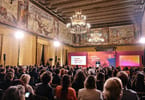Few would argue that the powerful urge to view smartphone and tablet content and messages often disrupts people’s discussions, attention spans and trains of thought. But to what extent are these devices a negative influence on meetings and educational sessions, and should having them on and checking them constantly be forbidden?
Some business experts agree with a ‘no device’ policy. In the Harvard Business Review, for example, contributing editor Amy Gallo decisively backed up this approach. In an article entitled ‘The Condensed Guide to Running Meetings’‘, she recommends that organizers ‘Ban Devices – they are unavoidably distracting for everyone.’
The major factor in Gallo’s view are the opinions of Francesca Gino, a professor at Harvard Business School. According to Gino, many people think they can multitask while listening to someone in a meeting but research shows that they can’t. “Multitasking is simply a mythical activity. We can do simple tasks like walking and talking at the same time, but the brain can’t handle multitasking,” says Gino. “In fact, studies show that a person who is attempting to multitask takes 50% longer to accomplish a task and he or she makes up to 50% more mistakes.” Neuroscientist Dr Daniel Levitin in his book ‘The Organized Mind’ describes multi-tasking as a ‘diabolical illusion.’
A clue to why many delegates feel the need to keep checking their phones for messages may be found in recent research commissioned by Warwick Conferences. This found that while out of the office on training courses, 81 percent of respondents had received emails requesting action to be completed at that time, sometimes from the manager who had sent them to the course.
Carina Bauer, CEO of the IMEX Group commented: “The disruptive and distracting influence of smartphone and device messages on meetings is clearly very powerful, but so too is the urge and often pressure (perceived or real) to check for and respond to requests and news real-time.
“The debate is whether to fight devices and their content or accept and even integrate them. There are a number of apps, such as audience response apps (Sli.do), or even apps that turn your phone into a microphone (crowd mics) that make mobile devices a genuinely useful part of the meeting session or event – when used in the way that the speaker or organizer intends. And, the harsh reality in a business context is that, in practice, it would often be very difficult to implement a ban that sticks.
“Perhaps a more sensible approach is to give delegates space and time within every event to check and respond to important messages, so that they can be fully focused on the content when actually in a session. Ultimately, the investment of time and money in attending an event should hopefully ensure that delegates want to stay focused on the content, as much as they wish to keep up to date with their emails.”
The IMEX Group’s questions were asked as part of MPI’s quarterly Meetings Outlook research in autumn 2015.
eTN is a media partner for IMEX.
WHAT TO TAKE AWAY FROM THIS ARTICLE:
- “Perhaps a more sensible approach is to give delegates space and time within every event to check and respond to important messages, so that they can be fully focused on the content when actually in a session.
- Ultimately, the investment of time and money in attending an event should hopefully ensure that delegates want to stay focused on the content, as much as they wish to keep up to date with their emails.
- “The disruptive and distracting influence of smartphone and device messages on meetings is clearly very powerful, but so too is the urge and often pressure (perceived or real) to check for and respond to requests and news real-time.






















